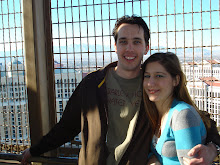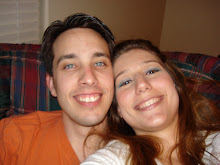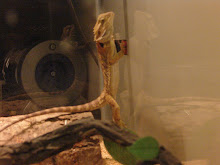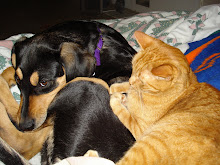In honor of Josh, here is a short story I wrote this past year. It's based on real events, but a lot has been fictionalized. I'll tell you at the end what's what:
“You must be a retard, too!”
“Don’t you have any real friends?”
“Are you stupid like them?”
The disdain of fifth graders can be cruel, and this was no exception. I’d signed up for the Special Friends program because I thought it would be fun and I was genuinely interested in being involved. As a Special Friend, I spent a half an hour in the Special Education room three days a week. I also ate lunch with the class and teachers in their room on Wednesdays. In 1988, Mainstreaming, now known as “Inclusion,” was a fairly new idea. My elementary school, instead of putting special education students into regular education classrooms, did the opposite and brought regular education students into the special education classroom.
I had eagerly agreed to participate in the program when I registered, but this wasn’t turning out the way I’d expected. As an Army Brat I found myself, once again, the new kid in school, and aligning myself with the “retards” was nothing short of social suicide. In the newly forming world of elementary school social status, I was swiftly sliding to an inevitable future as the fifth grade pariah.
Things were great during those half-hour visits. I was amazed at Jared’s superhuman hearing and ability to recognize me by the sound of my footsteps and his internal clock that told him it was 10:30am. I loved that he learned to say my name after three visits, even though he could barely communicate verbally. Any bad day was wiped away by Sophia’s sweet disposition and everpresent smile. She always knew when I needed a hug. Tyrone could memorize anything after hearing it twice and I found that he was the perfect study-buddy. In spite of his being in Special Education, I credit him with helping me through fifth grade math.
And then there was Eddie. “Hey, buddy!” was his standard greeting, no matter who he was talking to or even if he knew them. If his target made eye contact, then “Shake hands!” was next. “Me, Eddie. Your name?” he’d ask while pumping his new friend’s hand in his tight grip. Once Eddie was introduced, there was a hug to seal the friendship and he moved on to meet the next person. In his mind, Eddie had a lot of friends in the school. But I saw that the social stigma of being “retarded,” in Eddie’s case, having Down Syndrome, loomed dangerously near, threatening to crush his spirit.
I was sure that the horrible behavior of the “regular” students would wear him down, and I dreaded the day that Eddie finally figured out that his “friends” were really just the unlucky kids who didn’t see him quickly enough and get away in time. Calls of “Run! It’s the hugging retard!” echoed down the hall as students fled in front of him, screaming, ignoring the teachers’ futile reminders to “Please walk, students!” and “Inside voices!” Students behind him cringed in doorways, in obvious fear that he would turn around and trap them, but eager to see who would be his latest victim.
Anyone slow enough to be a hugging-Eddie-casualty would be subjected to endless torment at lunch, often required to keep a one-empty-seat barrier between himself and all others at the table – at least until the next day when the hugging-Eddie-germs had miraculously disappeared.
For me, this was a daily reality. My peers knew when I had spent time in the Special Ed room and tormented me mercilessly. No one would sit directly next to me for fear of catching whatever invisible germs I might be carrying. Even my best friend, Heather, participated in my ostracization. She dutifully sat one chair away as she opened her brown bag lunch and carefully studied the landscape of her bread in order to avoid direct eye contact. Looking back, I’m sure it was self-preservation that led her to participate. Nevertheless, to my fifth grade self esteem, it was a powerful blow.
I was miserable, but I also worried for Eddie, sure that the truth would finally hit him. I knew that one day, very soon, I would walk into room 111 and find him inconsolable with the realization that he didn’t really have friends, just kids he hunted down in the hall.
“So why do you want to leave the program?” The counselor looked at me with an unreadable expression. I was expecting disappointment, shame, accusation. But it was a simple, matter-of-fact question.
I didn’t want to tell her about the lunchroom or about how I couldn’t deal with Eddie finding out that he was as more of an outcast than me. I couldn’t bring myself to admit that I wanted my best friend to talk to me again instead of staring at her sandwich. I didn’t tell her that I went home sick every day, either because I’d been in room 111 or knew I’d have to go tomorrow. But more than anything, I was ashamed to admit who I was really letting down, the reason I looked for disappointment, shame, and accusation on her face.
Josh was two years old at the time. Born with Down Syndrome, he’d already been through two open-heart surgeries to repair a leaking mitral valve. My interest in being a Special Friend had everything to do with him. Faced with this question, “Why do you want to leave the program?” I realized that even though I had so many reasons to get out, I had an even bigger reason to stay.
If this is what Josh had to look forward to when he entered school, then I wanted to change it. I wanted him to have real friends. I wanted him to be accepted, not just in spite of his differences, but because of them. I wanted him to never have to face the meanness and spitefulness of the “normal” kids.
Sitting there facing the counselor, I knew that if I quit, then I became just like them and I might as well be running, screaming, down the hall from an Eddie hug. But I knew better. I wasn’t going to be that girl. I knew that continuing would be insignificant in the long run, as far as everyone in the school was concerned. Nothing would change. Heather would remain my weekend-friend. I would continue to eat alone and face the taunts of my classmates. But sticking with it was the only solution I could be happy with.
“I changed my mind,” I replied. “I think I’ll stay.”
So, I don't remember the room number. "Retard" was a word kids used. I still find it greatly offensive. I don't remember the names of the Special Education kids, but I do remember what they were like. My descriptions of them are true. Hugging-Eddie is the exception to the name-forgetting, but he wasn't Down Syndrome--I just wanted the connection to Josh for the story. I did get made fun of, but the seat thing didn't happen to me, but there was a certain group who would pretty much shun the people who'd been hugged by Eddie...me and the other Special Friends included. So the one-seat-barrier did exist, it just wasn't as widepread as I made it out to be.
I wasn't what you would call popular, so most people ignored me, anyway, but I did hear whispers quite often about how I did Special Friends (the real name of the program), and when a mean popular kid wanted to put me down, that was the ammunition. I did feel like quitting for a while, but I really did have the realization that I would be letting myself and Josh down by becoming like everyone else. I didn't, however, make this realization in such a dramatic way. It came to me slowly, the more I thought about it.
So I did take some license, but I like how this ended up. I hope you liked it too. I miss you, Joshie! (Photo pilfered from Jill's blog.)








